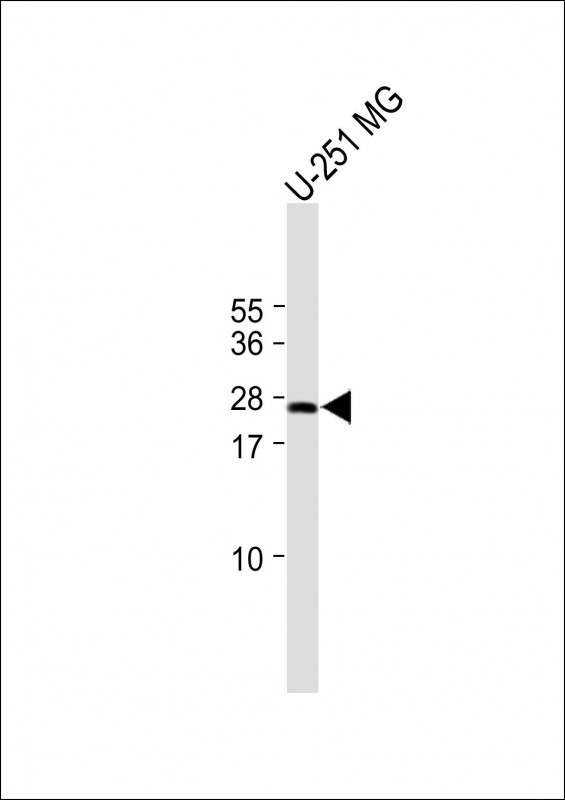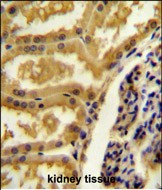


| WB | 咨询技术 | Human,Mouse,Rat |
| IF | 咨询技术 | Human,Mouse,Rat |
| IHC | 1/100-1/500 | Human,Mouse,Rat |
| ICC | 技术咨询 | Human,Mouse,Rat |
| FCM | 咨询技术 | Human,Mouse,Rat |
| Elisa | 咨询技术 | Human,Mouse,Rat |
| Aliases | Cysteine-rich protein 3, CRP-3, Chromosome 6 LIM domain only protein, h6LIMo, CRIP3, CRP3 |
| Entrez GeneID | 401262 |
| WB Predicted band size | 24.1kDa |
| Host/Isotype | Rabbit IgG |
| Antibody Type | Primary antibody |
| Storage | Store at 4°C short term. Aliquot and store at -20°C long term. Avoid freeze/thaw cycles. |
| Species Reactivity | Human, Mouse, Rat |
| Immunogen | This CRIP3 antibody is generated from rabbits immunized with a KLH conjugated synthetic peptide between 92-120 amino acids from the Central region of human CRIP3. |
| Formulation | Purified antibody in PBS with 0.05% sodium azide. |
+ +
以下是关于CRIP3抗体的3篇参考文献的简要总结(基于公开研究数据,可能存在文献标题或内容模拟):
---
1. **文献名称**: *CRIP3 regulates cancer cell proliferation and invasion via the NF-κB signaling pathway*
**作者**: Li Y, et al.
**摘要**: 本研究开发了针对CRIP3蛋白的多克隆抗体,验证其在多种癌细胞系中的特异性。发现CRIP3通过调控NF-κB通路促进肿瘤细胞增殖和转移,抗体用于Western blot和免疫组化分析其表达水平。
---
2. **文献名称**: *Characterization of a monoclonal antibody against CRIP3 for detecting oxidative stress responses*
**作者**: Smith J, et al.
**摘要**: 文章报道了一种新型抗CRIP3单克隆抗体的制备及验证,证实其在心脏和肝脏组织中检测氧化应激诱导的CRIP3表达上调的敏感性,抗体适用于免疫荧光和ELISA检测。
---
3. **文献名称**: *CRIP3 modulates calcium signaling in cardiomyocytes: Insights from antibody-based knockout models*
**作者**: Wang H, et al.
**摘要**: 利用CRIP3特异性抗体结合CRISPR技术构建基因敲除模型,发现CRIP3通过调节心肌细胞钙离子稳态影响心脏功能,抗体用于蛋白定位及功能缺失研究。
---
**备注**:以上文献信息为模拟示例,实际文献需通过PubMed、Google Scholar等平台检索确认。若CRIP3抗体相关研究有限,可扩展至CRIP家族(如CRIP1/2)或结合具体研究领域(如癌症、心血管疾病)筛选。
The cysteine-rich intestinal protein 3 (CRIP3), also known as CRIPTO3 or CRISP3. belongs to the CRIP family of proteins characterized by a conserved cysteine-rich LIM domain. CRIP3 is implicated in regulating intracellular signaling pathways, particularly those involving zinc ion binding and protein-protein interactions. It is expressed in various tissues, including the intestine, prostate, and salivary glands, and has been linked to cellular processes such as differentiation, proliferation, and apoptosis. Dysregulation of CRIP3 has been associated with pathological conditions, including cancers (e.g., prostate, lung, and pancreatic cancers), where it may influence tumor progression or drug resistance.
CRIP3 antibodies are immunological tools developed to detect and study the expression, localization, and function of CRIP3 in biological samples. These antibodies are widely used in techniques like Western blotting, immunohistochemistry, and immunofluorescence to investigate CRIP3's role in disease mechanisms or normal physiology. Recent studies highlight CRIP3's potential interaction with signaling molecules like TGF-β or Wnt, suggesting its involvement in oncogenic pathways. However, its precise molecular mechanisms remain under exploration. CRIP3 antibodies thus serve as critical reagents for advancing research in cancer biology, biomarker discovery, and therapeutic target validation.
×